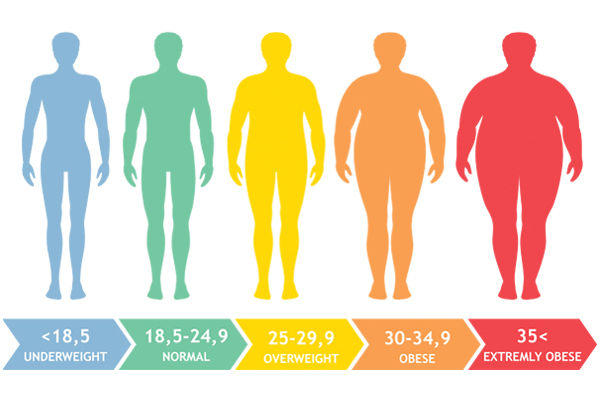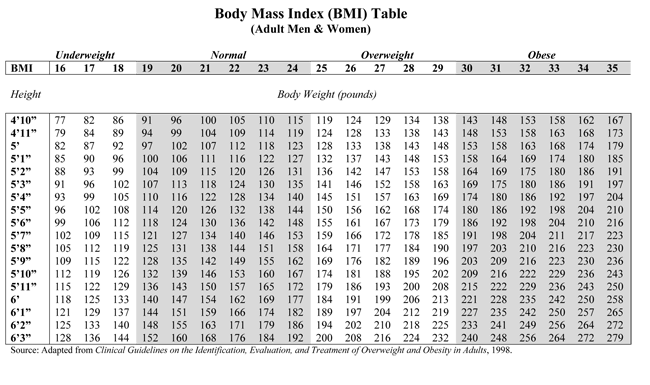What Is BMI and Should I Worry About It?

BMI can help you figure out what your ideal body weight should be, but there’s a lot more to consider when it comes to being healthy.
When it comes to your health and weight, there’s a whole smorgasbord of numbers that health professionals reference.
Some of those numbers include blood pressure, cholesterol, and BMI, a.k.a.,”body mass index.”
What Is BMI?
BMI is a number that usually ranges between 16 and 35, and it’s determined by comparing your weight and your height.
Your BMI number indicates if you are in the range for your ideal weight, or if you are underweight or overweight.
How to Calculate BMI

The easiest way to figure out your BMI is to look at a chart (like the one below) or to plug your height and weight into a formula.
BMI is calculated by dividing your weight in kilograms by height in meters squared.
Here’s how to calculate BMI for someone who is 150 pounds and 5’5” tall:
- 150 pounds = 68 kilograms
- 5’5” = 1.65 meters
- 68/(1.65)² = 24.98 BMI
What Is a “Good” BMI?
According to the BMI scale, if you fall between 18.5 and 24.9 you’re considered to be a normal, healthy weight.
(This means the person in our example above is just over the line of being at an ideal weight.)
If you clock in below 18.5, you are considered underweight.
On the other side of the scale, if you’re between 25–29.9, this suggests that you’re overweight.
And, finally, if your number is any higher than 30, it means that you fall into the obese category.

Here’s a BMI chart to help you visualize these segments easier:
Is BMI reliable? The Problem With Having a “Healthy” BMI
BMI has been used to measure obesity since the 1800s when Belgian mathematician Adolphe Quetelet developed a formula to compare weight and height.
If it’s been around for that long, it must be reliable … right?
Not really. It can be inaccurate and misleading because it doesn’t take body composition into consideration.
This means that a 200-pound six-foot tall athlete who’s made of muscle shares the same BMI as a 200-pound six-foot tall couch potato who has a high body fat percentage.
Is BMI accurate if you’re muscular?

Your ideal body weight depends much more on your muscle-to-fat ratio.
“BMI is flawed because it’s not an actual measure of health,” says Jeff Hunger, from the Department of Psychological and Brain Sciences at the University of California, Santa Barbara. “It’s a pretty poor proxy for actual clinical indicators of health.”
According to the BMI scale, many athletes are considered overweight or obese.
Even the Centers for Disease Control and Prevention (CDC) recognizes the fault of the BMI scale.
According to the CDC website, “Athletes may have a high BMI because of increased muscularity rather than increased body fatness. In general, a person who has a high BMI is likely to have body fatness and would be considered to be overweight or obese, but this may not apply to athletes.”
A study published in the International Journal of Obesity, co-authored by Hunger, further supported this and drew the conclusion that there isn’t even a direct correlation between metabolic health and BMI.
“Nearly half of overweight individuals, 29% of obese individuals, and even 16% of obesity type II/III individuals were metabolically healthy,” the study claims.
“Moreover, over 30% of normal weight individuals were cardiometabolically unhealthy.”
In other words, they were at a higher risk for heart disease, diabetes, or a stroke.
What is better than BMI for measuring?
Additional research suggests that instead of focusing on reaching your ideal body weight, it’s more effective to pay attention to waist size.
A 2016 article published in the journal Obesity found that people who were considered non-obese by BMI standards, but obese by waist circumference, had about a 20 percent higher risk of cardiovascular disease than those who weren’t obese by either standard.
How Do I Find My Ideal Body Weight?
When it comes down to it, being healthy is more than just a number on a scale.
Even if you do find your ideal body weight by looking at a weight chart or calculator, there’s a lot more to take into consideration.
“Rather than finding your BMI, you can talk with your doctor about how you’re doing on actual indicators of health like the ones we measured in our study,” Hunger recommends.
Keeping an eye on factors like blood pressure, blood glucose, cholesterol, and triglycerides, and also measures of inflammation and insulin resistance can give you a better overall picture of your health in a more detailed way than just comparing your height and weight.
“Regardless of your BMI you should try to focus on improving behaviors that are important for health: eating well, staying active, and getting enough sleep,” says Hunger. “These are important habits for everyone, regardless of where you fall on the weight spectrum.”

